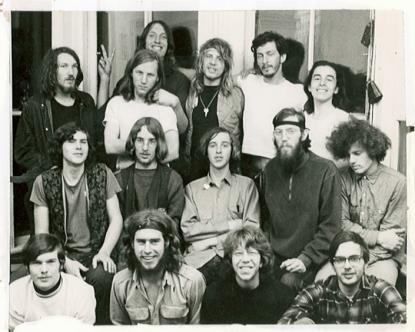My first job was as a cowboy, or rather a horseboy (though that is another story). It was in the rump days of the late 1960s known as the early '70s, in the rump end of Huerfano County, Colorado, the county of orphans, of rolling mesas, silver and straw. Strung between the barbed wire and irrigation ditches was the ranch I worked, overseen by a saddlemaker with one thumb and his five-year old son named Beater (he couldn't pronounce the P) who was known primarily for his ability to pound down any backwash beer left tableside while his father crowed: "I'm goin' bishin'."
And it was in Huerfano County that I first learned the paradox of the American commune. We had gone into town one afternoon to pick up the mail — the foreman, Beater, and I — and while fumbling around the general store, we saw two of our neighbors come in, rail-thin reeds from a nearby commune, probably searching for something like brown rice or tofu among the tins of wax beans that never sold. We talked about them more than we talked to them, and we usually called them the goat people, only partly because of their preference in livestock. In fact, nearly all we knew about them was that they could be found late mornings darting around the woods, more naked than not, always bruised and blending into the short grass and aspen. They didn't say a word, as far as I remember, but when they headed for the back of the store, Beater stepped out in the aisle, hands on hips, head cocked back, and shouted: "damned hibbies, go home."
Beater's opinion wasn't far from the opinion of most Huerfano-Americans I knew at the time, that the goat people somehow didn't belong in America, that somehow they all ought to go home. That we really knew nothing about them didn't matter, that no two communes were alike was beside the point. The goat people, the foreman said, were just a loose bunch of unscrewed nuts, but they were nuts from the same hardware shop as the intellectuals of Ray Mungo's Packer Corners and they were from the same sack as the back-to-the-landers of Montague Farm, the red radicals of Red Clover, and the spiritual seekers of the Brotherhood of the Spirit. There was a lot to rave about with any of these groups, but in the end, the most fervid imaginings about sex and drugs, squalor and politics, wasn't what fed Beater's unease. Go home said it all.
For a lot of Beaters, communes were just plain ugly to think: they said too much about the problem of home, they were unsettling, uncanny. Raised in a country where we cling to the belief that all men are created equal, but in an economy that creates — or requires — inequality, communes raise troubling questions. As communards stand apart by talking about (and living) a new family, a new economy, and new equality, they become a disturbing reminder of how Americans stand apart from our ideals; they represent a moment in which the curtain lifts to reveal what community might be: dirty, ragged and chaotic. Even more, they confront a second pillar of American life, transmogrifying the hyper-individualism that has been yoked to our psyches since the darkest industrial days into a vision, if not a reality, of how we might live in a non-Hobbesian world.
We are now in a season where we are selecting a national leader, selecting from alternatives who in some respects play into the polarities unsettled by communes: the meanings of equality, of individuality and community. It would be nice to say that looking at leadership in communes could guide us to an alternative future, but I am less than optimistic. To be sure, in many respects, communes are all about equality, equality of role, of work, of position. But the reality is often little different than the straight world. In many communes, work breaks down along "traditional" lines of gender, and class plays a part, largely unexamined, in many others. In many communes, it seems that a person surrenders parts of the individual to become communal, and one wonders what must be excluded to keep the communal coherent.
Few communes are true cesspools of equality: they have leaders who shape and prod them along. At the early Montague Farm, Marshall Bloom stood out among his peers for charisma, ideas, and energy, and the Farm and its sister communes later had a leadership core: some members were clearly within, some without, and for those who didn't belong, drifting away was the best option.

Leadership took a stronger turn at the Brotherhood of the Spirit, where Michael Metelica provided direction. Communes like the Brotherhood are easier for most Americans to understand, being more like our nation as a whole, providing a leader to whom one can look, and whom one can paint almost any image. Communal living is hard, following is easy, and Michael's flaws make him easy to demonize. For outsiders they transform him into a cultish leader of will-less sheep, and indeed, many in the Brotherhood acknowledged the injustice of Michael's control of finances, they recognized his excesses, his favoritism, and exploitation. But for some, acknowledgement is where it ends. While some were scarred by the experience, for others, Michael's flaws are part of what made him an effective vehicle for spiritual growth, a doppelganger for the good.
People who stand side by side in a communal living room often have dramatically different experiences, different perceptions about belonging, fairness, and leadership. They don't agree, or can't, about the reality they live. We are now in a season where we are selecting a new national leader, where community and equity are part of the conversation, and when we all go home on Tuesday, I wonder still how easy that living room will feel.

